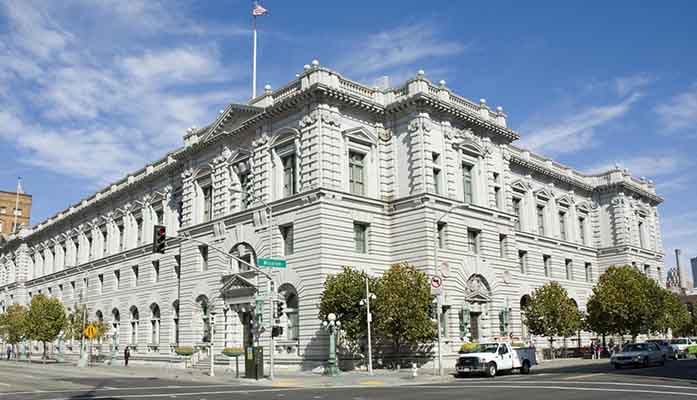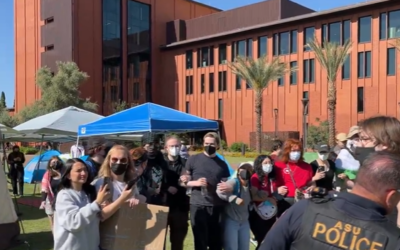By Corinne Murdock |
On Monday, the Ninth Circuit Court of Appeals heard oral arguments in a lawsuit arguing against the state’s ban on abortions solely for genetic defects.
In the case, Isaacson v. Mayes, pro-abortion doctors and groups appealed the district court’s denial of a preliminary injunction against Arizona’s ban on abortions based on genetic defects.
The legislature passed the ban, SB 1457, back in 2021.
The plaintiffs in the lawsuit against the ban are abortionists Paul Isaacson and Eric Reuss, along with the National Council of Jewish Women, Arizona National Organization For Women, and Arizona Medical Association.
Isaacson was a Phoenix-based abortionist with Family Planning Associates. Reuss was a Scottsdale-based OBGYN and former board member for Planned Parenthood of Arizona.
Judges Roopali Desai, Ronald Gould, and Andrew Hurwitz heard the oral arguments. While Desai and Hurwitz were engaged in the arguments with their questions, Gould hardly spoke except to request an adjustment of the livestream audio.
In March, House Speaker Ben Toma (R-LD27) and Senate President Warren Petersen (R-LD14) stepped up to defend the ban after Attorney General Kris Mayes said she would refuse to enforce the law. Mayes is acting as the defense in the lawsuit currently.
During Monday’s oral arguments, the main question at hand was whether the plaintiffs had Article III standing. Article III of the Constitution, as held by the Supreme Court, requires plaintiffs to prove an actual or imminent alleged injury that is concrete and particularized.
Jessica Sklarsky with the Center for Reproductive Rights argued on behalf of the plaintiffs that they suffer undisputed economic harms and threat of prosecution due to the abortion ban. The district court determined that the plaintiffs failed to meet the standard set by the 2014 Supreme Court case Susan B. Anthony List v. Driehaus, which determined that pre-enforcement challenges satisfy the Article III standard and are justiciable when a statute’s enforcement is sufficiently imminent.
Sklarksy also argued that the abortion ban qualified as a vague law, and therefore violated due process rights.
“Vague laws force those they govern to either avoid doing anything that is arguably covered by the law, or to engage in that conduct with the constant threat of arbitrary enforcement,” said Sklarsky.
Denise Harle with Alliance Defending Freedom (ADF), counsel on behalf of Toma and Petersen, countered that no Article III injury exists due to the lack of a credible threat of enforcement.
Harle pointed out that all 15 county attorneys have acceded their authority to Mayes, and that Mayes has disavowed enforcement of abortion law. Harle also pointed out Gov. Katie Hobbs’ executive order in June usurping all county attorneys’ authority on abortion law and conferring it to Mayes.
Hurwitz and Desai pushed back against Harle’s reference to Mayes and Hobbs’ conduct, arguing that Mayes didn’t issue a disclaimer in this case specifically detailing her intent to not enforce the law.
Hurwitz indicated that Toma and Petersen’s support of the law, as well as the private enforcement aspect of the law, indicated a credible threat of enforcement.
“Does the law really require that a credible threat be communicated? If the state of Arizona passes a statute and the two leaders of the legislature are here defending its constitutionality, isn’t that enough to show there is a credible not a certain but a credible threat of enforcement?” asked Hurwitz.
Harle disagreed, saying the potential for private enforcement constituted a hypothetical. She alluded to the arrangement by Hobbs and Mayes to not enforce abortion law.
“[T]he theoretical possibility of an injury sometime in the future is too conjectural when it’s not imminent,” said Harle.
Desai followed up by stating that the court’s decision in Tingley v. Ferguson could apply to this case. In that case, a family counselor challenged the state of Washington’s ban on conversion therapy as a violation of free speech and religious practice. Harle responded that the existence of a law alone wasn’t sufficient for direct injury.
“Virtually anyone could look at a law, say ‘I’m not sure what that means, I’m going to do something or not do something’ [and] that would be enough for a federal court to weigh in and adjudicate the merits of that claim on a facial challenge,” said Harle.
Watch the full hearing here:
Corinne Murdock is a reporter for AZ Free News. Follow her latest on Twitter, or email tips to corinne@azfreenews.com.








